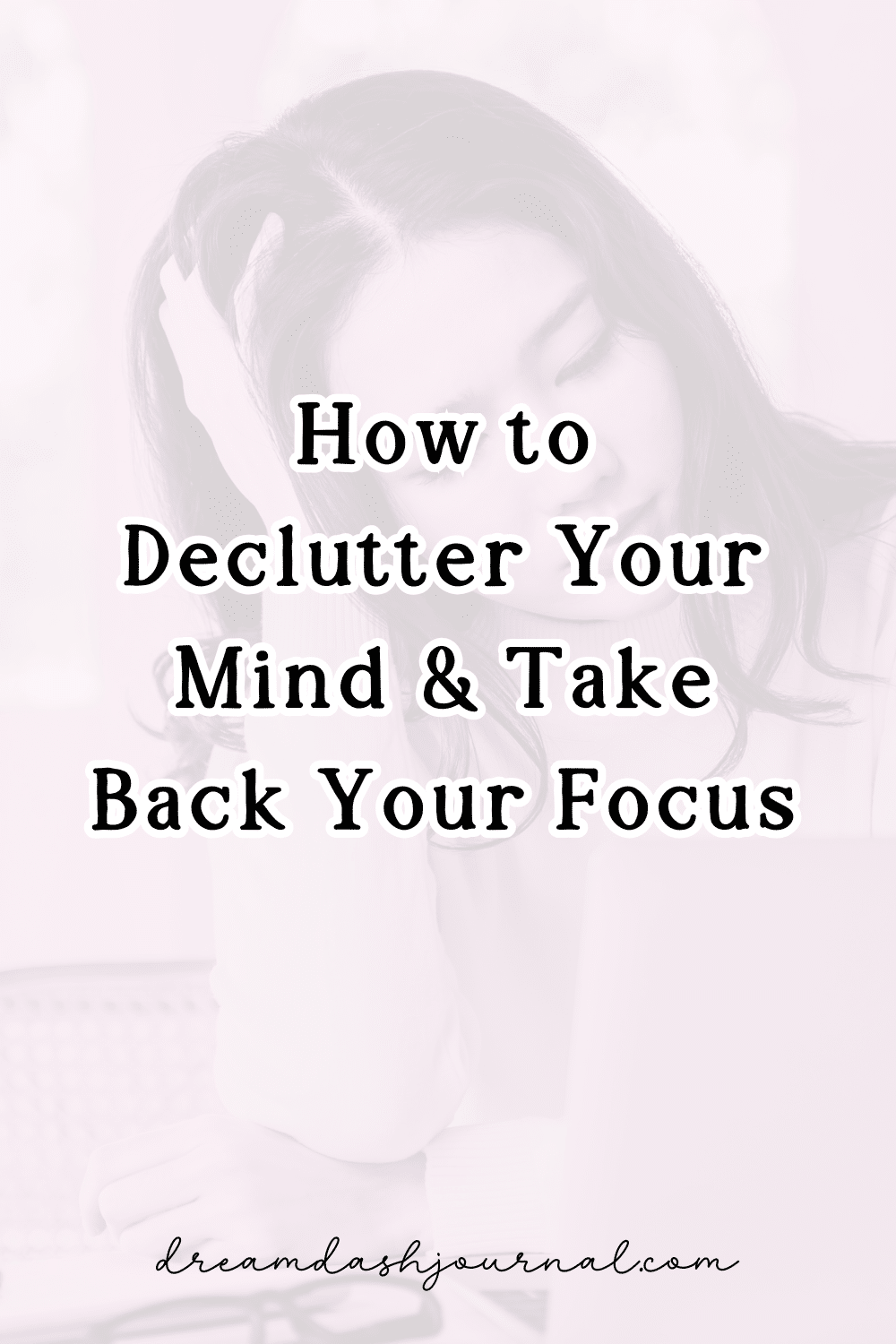5 Easy Ways to Declutter Your Mind for Better Focus
Feeling mentally foggy, scattered, or overwhelmed? Me, too!
When you get super busy, it’s easy for thoughts to pile up like clutter on a desk. Everything seems messy, distracting, and hard to manage.
When there’s too much going on in your head, it can feel nearly impossible to focus on anything clearly. That’s why it’s important to declutter your mind. You make more space for clarity, peace, and productivity!
“Decluttering your mind” may sound like a weird way to put it, but really, it just means getting organized. The way I like to go about this is by doing the little things first. Things you need to do that you might normally delay doing. Things like tidying your space, writing things down, getting fresh air, or even stretching.
These actions might not seem important at first, but they can be a way of clearing mental noise. They help ground you in the present moment so you can refocus your energy.
When your mind feels clearer, you naturally begin to feel more confident, creative, and in control of your day. You stop spinning your wheels and start making intentional choices again. Instead of being pulled in ten directions at once, you gain the ability to focus on your priorities, stay calm, and enjoy life more. Sometimes, mental space to think, breathe, and move forward needs to be made intentionally.
So, I hope you’ll enjoy these realistic, calming, and simple ways to declutter your mind and take back your focus. Let’s dive in!
*This article may contain affiliate links, meaning I may receive a small commission at no additional cost to you for products you purchase via this website. For more information, click here.*

*This article is for entertainment purposes only and contains no medical advice or information. No financial advice is included. See privacy policy & disclosures for more details.
5 Easy Ways to Declutter Your Mind
1. Clean Up Your Digital Life
Your mind holds so many things. Everyday problems, to-dos, and worries, along with memories and emotions. And when your digital world is a mess, it can weigh you down even more. A cluttered inbox or chaotic desktop can feel like a thousand little reminders of everything you haven’t dealt with yet. That low-level stress piles up.
Start by deleting emails you’ll never read, unsubscribing from lists you don’t even remember signing up for, and filing away messages you might need later. Clean your desktop. Then, organize your Google Drive and cloud storage. You don’t have to be perfect, but creating folders and labeling them clearly can give you a real sense of peace. When your digital space is clean, your thoughts feel more sorted, too.
It’s surprisingly refreshing to see a tidy screen. And best of all, this kind of cleanup puts you in motion. It’s productive, but not overwhelming. Just enough progress to build momentum for whatever’s next.
Related: 12 Best Ways to Clear Your Mind After A Stressful Day
2. Declutter Your Home (Especially Areas Where You Spend the Most Time)
Your physical space affects your mental space more than you might think. If your room, office, or living space is overflowing with stuff, it’s easy to feel scattered or stuck. Mess and clutter act like constant background noise for your brain. Clearing that out bit by bit often brings clarity.
Focus on the area you spend the most time in. Maybe that’s your bedroom, your kitchen, or your desk. You don’t have to do a full minimalist overhaul. Just pick one space and start small. Fill a trash bag with things to toss or donate. Wipe down surfaces. Put things where they belong. Even five minutes of puttering around and tidying up can help you feel more grounded and in control.
As you organize, you’re also energetically signaling to your mind that you’re ready for a fresh start. It’s a symbolic action. A decluttered space makes room for clearer thoughts, new ideas, and calm energy. Plus, every little corner you clean is one less thing to stress about later.
Related: 31 Home Journal Prompts for a Cozy & Happy Household
3. Stock Up on Food and Home Essentials
It might seem unrelated at first, but taking care of the basics like shopping for groceries and household supplies frees up so much mental space. Running out of toilet paper or realizing there’s no dinner plan after a long day can trigger unnecessary stress. These little things add up and crowd your brain.
Take a moment to check what you’re running low on. Do a quick scan of the fridge, pantry, and bathroom. Make a list and restock your essentials. Food, trash bags, soap, paper towels, toothpaste- whatever you use daily. It’s also a great time to plan a few easy meals and prep what you can ahead of time. Even cutting veggies or cooking potatoes can help you feel more prepared.
This kind of practical prep work gives your future self a break. It reduces last-minute scrambling and keeps your days flowing more smoothly. You feel productive, but not rushed. And the best part is it’s something you likely need to do anyway.
4. Move Your Body to Release Stuck Energy
Your body holds on to stress, and when you move, you release it. Physical movement is one of the fastest ways to clear your mind because it helps shake off tension, reset your nervous system, and shift your focus back to the present.
This doesn’t have to mean running a marathon. Stretching for ten minutes, doing a few yoga poses, or even foam rolling your back and shoulders can do wonders. If you enjoy strength training, lifting weights can leave you feeling strong and centered. If you’ve been sitting too long, go for a walk. Let your thoughts wander, listen to music, or enjoy the quiet.
You don’t need to be perfect or push yourself hard. The goal is release. Get the energy moving, get out of your head, and let your body help you realign. Often, once you’ve moved a little, your thoughts settle naturally. Solutions appear. Clarity returns. It’s amazing how physical movement can declutter the mind.
5. Journal to Release Mental Clutter
When your brain feels overloaded, journaling is like a deep exhale. You get to pour out everything that’s swirling around in your head and leave it safely on the page. It’s a way to clear your inner landscape so you can think and breathe a little more freely.
One of the simplest ways to do this is a brain dump. Just set a timer for ten to fifteen minutes and write down everything on your mind. No structure, no filter. To-do lists, worries, random thoughts, feelings, appointments, ideas can all go in your journal. If you’re unsure of what to write, try some journal prompts. Here are a few different ones you can use:
30 Guided Journal Prompts for a Fresh Start
50 Inspiring Gratitude Journal Prompts with PDF Printable
100 Self-Care Journal Prompts With Free PDF Printable
Another idea is to write a short list of your top three priorities for the day or week. Or, bring out the art supplies and start an art journal.
Decluttering Your Mind is an Ongoing Process
Life has a way of piling on, one thought after another, one feeling layered beneath the next. Even on calm days, there’s accumulation. A conversation that lingers, a decision waiting to be made, an old memory that resurfaces. This isn’t bad or a flaw, it’s just life. You’re living life, growing, and always evolving. The mind collects what it notices, what it needs, and sometimes what it isn’t ready to process yet.
Mental clarity isn’t something you achieve once and keep forever. It shifts with the seasons you’re in. When the clutter starts to feel heavy, there’s power in noticing it and gently choosing to clear space. Letting go doesn’t mean forgetting or forcing peace, it simply means making room. For rest, for energy, for what’s next.
Reflection helps, but it’s the doing that often brings the greatest release. Taking action in the physical world helps restore balance. Whether you’re clearing a drawer, going for a walk, or prepping meals, these small efforts support your inner world more than we realize. We don’t live only in our minds. We live in our bodies, in homes, in spaces that reflect and shape how we feel.
Mental decluttering can begin with something simple, like tidying a shelf, writing down a thought, or moving your body. These acts create movement, and movement creates momentum. The inner clearing and the outer doing work together to help you feel grounded, focused, and fully present.
Final Thoughts
I hope you liked these tips to help declutter your mind. Sometimes, even the smallest shifts, like clearing your space, writing things down, or simply stepping outside, can make a big difference in how you feel and focus.
Personally, I really enjoy puttering around the house, tidying up little things here and there. It just helps me feel better, and it helps me process my thoughts.
As much as I like writing, I don’t always like sitting still. Staying physically active is my favorite way to clear my head. Moving my body, whether by vacuuming or taking walks outside, always brings me back to center.
At the end of the day, it’s about finding what works for you. With a few intentional habits, you can return to clarity, calm, and that steady sense of focus that helps you move forward with ease. What are your favorite ways to calm and declutter your mind? Tell me in the comments!
You may also enjoy:
6 Ways to Get Out of a Bad Mood Fast (Reset Your Mind)
30 Guided Journal Prompts for a Fresh Start
50 Affirmations for Letting Go & Finding Inner Peace
How to Feel Beautiful & Accept Yourself {Start This Habit Now!}
35 Finding Yourself Quotes: Wise Words About Living Authentically







